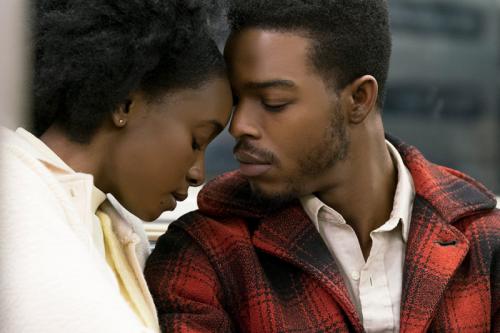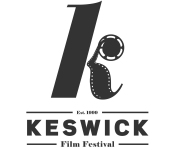Reviews - If Beale Street Could Talk
If Beale Street Could Talk
Reviewed By Vaughan Ames

If Beale Street Could Talk
The Twentieth Year of Keswick Film Club came to an end on Sunday night with the Oscar-winning 'If Beale Street Could Talk'. It was also picked as one of the best 10 films of the year by the American Film Institute, so it was looking good as a film before it even began. As I had also visited the actual Beale Street in Memphis last year and been inspired by the music and the downtrodden lives of black people even today, I had my own reasons to expect a lot of our finale.
The film title comes from the book of the same name by James Baldwin, written in 1974 (this in turn comes from the W C Handy blues song – Beale Street Blues – written in 1917, when Beale Street was at its height as the home of the Blues). Baldwin wanted to show how hard life was for black people, without producing overt political propaganda.
The story is, at heart, a simple love story: It is the early 70s. Tish and Fonny have known each since they were babies, growing up together as friends and falling deeply in love when she is 19, he is 22. They want to get married, but they are struggling to find a place to live together as no white landlord wants to rent to 'niggers'. Fonny hits a white man trying to come on to Tish in a shop and is seen by a white racist cop who threatens to arrest Fonny for the attack, but is stopped when the shopkeeper defends him. The cop vows to get him later and duly frames him for a rape he didn't do. Once Fonny is in prison, Tish realises she is pregnant... The rest of the book covers the families' attempts to clear Fonny as Tish gets nearer and nearer to being a mother. In the background, there is a great interplay between Tish's and Fonny's family; both fathers are doing everything they can (legal or otherwise) to get the money together to pay for the (inevitably white!) lawyer. Fonny's mother is busy trusting in God to either get him out or show him what a sinner he has been and Tish's mother is doubly busy supporting Tish and going down to Puerto Rico to try to persuade the rape victim that Fonny is innocent (she is played wonderfully by Regina King, who won the Oscar for her acting).
Not a huge plot, then, but a great deal of emotion to play with. The film manages to keep pretty close to the book, and certainly keeps the dreamy, poetic feel perfectly, though maybe overplaying the violins a bit in some of the scenes when Kiki Lane (Tish) and Stephen James (Fonny) really didn't need a lot of help showing how much in love they were. I guess the Academy Award folks didn't agree with me, as the music was Oscar nominated too... The director, Barry Jenkins, used flashbacks to show us the back story, which worked well for me, though he also decided to change the ending, which I thought was shame; I won't tell you what happens as, hopefully, you will get chance to see it later!
Overall, then, possibly not quite a fantastic as I had hoped, but still a good film and well worth comparing with 'The Hate U Give' which we showed earlier in the year – a much more overtly political view of racism.
If Beale Street Could Talk
If Beale Street could talk it would surely start with the Blues:
WC Handy started it; Louis, Furry, Muddy, BB and Albert, even Elvis kept it moving.
If Beale Street could talk, it would tell you of the clubs:
Blues City Cafe, BBs, Rum Boogie’s, Handy’s, or Jerry Lee’s, they all keep you grooving.
But If Beale Street could talk, it would tell you, too, of the slavery:
The cotton, the whips, the abuse, being sold, the rapes; black folks suffered it.
If Beale Street could talk, it would ‘PRAISE THE LAWD’:
Their faith kept them upright, but also kept them down.
If Beale Street could talk, it would relive the civil war:
Black people were freed, but only into sharecropping and white domination.
If Beale Street could talk, it would shout about Civil Rights:
The brave folks who refused to lie down except when told not to.
If Beale Street could talk, it would remember Martin Luther King:
He stopped black seats on busses, he won them the vote.
If Beale Street could talk, it would definitely remember Martin Luther King:
He supported workers strikes and died for their freedom.
So...If Beale Street could talk, it would talk of black history:
Of slavery ended, but oppression remaining, of mass incarcerations...
BUT If Beale Street could talk; it would always talk of hope:
Of the black spirit, of a black president, of WHITE folks playing the blues...and of Oscar winning BLACK films!
The film title comes from the book of the same name by James Baldwin, written in 1974 (this in turn comes from the W C Handy blues song – Beale Street Blues – written in 1917, when Beale Street was at its height as the home of the Blues). Baldwin wanted to show how hard life was for black people, without producing overt political propaganda.
The story is, at heart, a simple love story: It is the early 70s. Tish and Fonny have known each since they were babies, growing up together as friends and falling deeply in love when she is 19, he is 22. They want to get married, but they are struggling to find a place to live together as no white landlord wants to rent to 'niggers'. Fonny hits a white man trying to come on to Tish in a shop and is seen by a white racist cop who threatens to arrest Fonny for the attack, but is stopped when the shopkeeper defends him. The cop vows to get him later and duly frames him for a rape he didn't do. Once Fonny is in prison, Tish realises she is pregnant... The rest of the book covers the families' attempts to clear Fonny as Tish gets nearer and nearer to being a mother. In the background, there is a great interplay between Tish's and Fonny's family; both fathers are doing everything they can (legal or otherwise) to get the money together to pay for the (inevitably white!) lawyer. Fonny's mother is busy trusting in God to either get him out or show him what a sinner he has been and Tish's mother is doubly busy supporting Tish and going down to Puerto Rico to try to persuade the rape victim that Fonny is innocent (she is played wonderfully by Regina King, who won the Oscar for her acting).
Not a huge plot, then, but a great deal of emotion to play with. The film manages to keep pretty close to the book, and certainly keeps the dreamy, poetic feel perfectly, though maybe overplaying the violins a bit in some of the scenes when Kiki Lane (Tish) and Stephen James (Fonny) really didn't need a lot of help showing how much in love they were. I guess the Academy Award folks didn't agree with me, as the music was Oscar nominated too... The director, Barry Jenkins, used flashbacks to show us the back story, which worked well for me, though he also decided to change the ending, which I thought was shame; I won't tell you what happens as, hopefully, you will get chance to see it later!
Overall, then, possibly not quite a fantastic as I had hoped, but still a good film and well worth comparing with 'The Hate U Give' which we showed earlier in the year – a much more overtly political view of racism.
If Beale Street Could Talk
If Beale Street could talk it would surely start with the Blues:
WC Handy started it; Louis, Furry, Muddy, BB and Albert, even Elvis kept it moving.
If Beale Street could talk, it would tell you of the clubs:
Blues City Cafe, BBs, Rum Boogie’s, Handy’s, or Jerry Lee’s, they all keep you grooving.
But If Beale Street could talk, it would tell you, too, of the slavery:
The cotton, the whips, the abuse, being sold, the rapes; black folks suffered it.
If Beale Street could talk, it would ‘PRAISE THE LAWD’:
Their faith kept them upright, but also kept them down.
If Beale Street could talk, it would relive the civil war:
Black people were freed, but only into sharecropping and white domination.
If Beale Street could talk, it would shout about Civil Rights:
The brave folks who refused to lie down except when told not to.
If Beale Street could talk, it would remember Martin Luther King:
He stopped black seats on busses, he won them the vote.
If Beale Street could talk, it would definitely remember Martin Luther King:
He supported workers strikes and died for their freedom.
So...If Beale Street could talk, it would talk of black history:
Of slavery ended, but oppression remaining, of mass incarcerations...
BUT If Beale Street could talk; it would always talk of hope:
Of the black spirit, of a black president, of WHITE folks playing the blues...and of Oscar winning BLACK films!
Find A Film
Search over 1500 films in the Keswick Film Club archive.
Friends
KFC is friends with Caldbeck Area Film Society and Brampton Film Club and members share benefits across all organisations
Awards
Keswick Film Club won the Best New Film Society at the British Federation Of Film Societies awards in 2000.
Since then, the club has won Film Society Of The Year and awards for Best Programme four times and Best Website twice.
We have also received numerous Distinctions and Commendations in categories including marketing, programming and website.
 Talking Pictures
The KFC Newsletter
Talking Pictures
The KFC Newsletter
Links Explore the internet with Keswick Film Club


